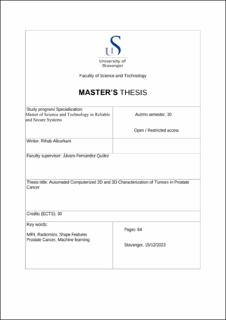Thesis title: Automated Computerized 2D and 3D Characterization of Tumors in Prostate Cancer
Master thesis
Permanent lenke
https://hdl.handle.net/11250/3116239Utgivelsesdato
2023Metadata
Vis full innførselSamlinger
- Studentoppgaver (TN-IDE) [823]
Sammendrag
The diagnostic pathway of Prostate cancer (PC) has been changed recently, and medical imaging has gained a significant role. Especially, Magnetic Resonance Imaging (MRI) has emerged as a pivotal tool in advancing cancer diagnosis. However, the interpretation of MRI data is encumbered by the intricate, time-demanding nature of the task and the inherent variability among readers, particularly radiologists. Considerably, achieving precise detection and thorough characterization of prostate tumours assumes paramount importance in facilitating subsequent procedures like guided biopsies. Convolutional neural networks (CNNs) have gained widespread traction in automating tasks encompassing classification and segmentation. Machine learning (ML) models can perform well as compared to deep neural networks, with, in some cases, the advantage of being easier to understand and interpret.Given the importance of interpretability for clinicians to understand and interpret the features and decision-making process of the AI model, we select ML over deep learning (DL) for the early detection of prostate cancer from MRI images. The principal intent of this research is to serve as a starting point to the development of a computer-aided diagnosis system on ML. We employ prostate features instead of tumour features for an early detection of PCa. With this approach, we aim to avoid issues related to the difficulty of detecting and segmenting small tumour structures and their subsequent characterization problems. The main goal of the proposed model is to achieve a better strategy for detecting prostate cancer and accurately selecting the suitable decision for treatment procedures. The proposed model represents a significant leap forward in the realm of prostate cancer detection and diagnosis. The current strategies offer enhanced accuracy and reliability as compared to deep learning in identifying prostate cancer. Our analysis indicates that logistic regression (LR) emerges as the optimal machine learning model for our objectives, as evidenced by its superior accuracy (0.88) and ROC-AUC score (0.93). These metrics underscore LR's reliability and interpretability, key factors in its effectiveness. This study proposes that our machine learning system could significantly improve the detection of prostate cancer, thereby offering healthcare professionals critical insights to inform personalized treatment strategies.
